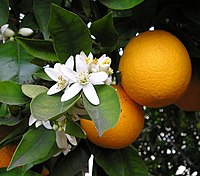
Photo from wikipedia
Low pH-induced alterations in gene expression profiles and organic acids (OA) and free amino acid (FAA) abundances were investigated in sweet orange [Citrus sinensis (L.) Osbeck cv. Xuegan] leaves. We… Click to show full abstract
Low pH-induced alterations in gene expression profiles and organic acids (OA) and free amino acid (FAA) abundances were investigated in sweet orange [Citrus sinensis (L.) Osbeck cv. Xuegan] leaves. We identified 503 downregulated and 349 upregulated genes in low pH-treated leaves. Further analysis indicated that low pH impaired light reaction and carbon fixation in photosynthetic organisms, thereby lowering photosynthesis in leaves. Low pH reduced carbon and carbohydrate metabolisms, OA biosynthesis and ATP production in leaves. Low pH downregulated the biosynthesis of nitrogen compounds, proteins, and FAAs in leaves, which might be conducive to maintaining energy homeostasis during ATP deprivation. Low pH-treated leaves displayed some adaptive responses to phosphate starvation, including phosphate recycling, lipid remodeling, and phosphate transport, thus enhancing leaf acid-tolerance. Low pH upregulated the expression of some reactive oxygen species (ROS) and aldehyde detoxifying enzyme (peroxidase and superoxidase) genes and the concentrations of some antioxidants (L-tryptophan, L-proline, nicotinic acid, pantothenic acid, and pyroglutamic acid), but it impaired the pentose phosphate pathway and VE and secondary metabolite biosynthesis and downregulated the expression of some ROS and aldehyde detoxifying enzyme (ascorbate peroxidase, aldo-keto reductase, and 2-alkenal reductase) genes and the concentrations of some antioxidants (pyridoxine and γ-aminobutyric acid), thus disturbing the balance between production and detoxification of ROS and aldehydes and causing oxidative damage to leaves.
Journal Title: International Journal of Molecular Sciences
Year Published: 2022
Link to full text (if available)
Share on Social Media: Sign Up to like & get
recommendations!